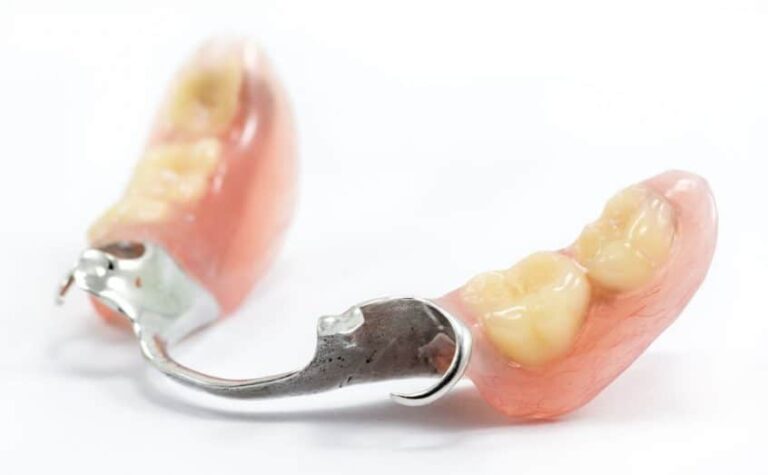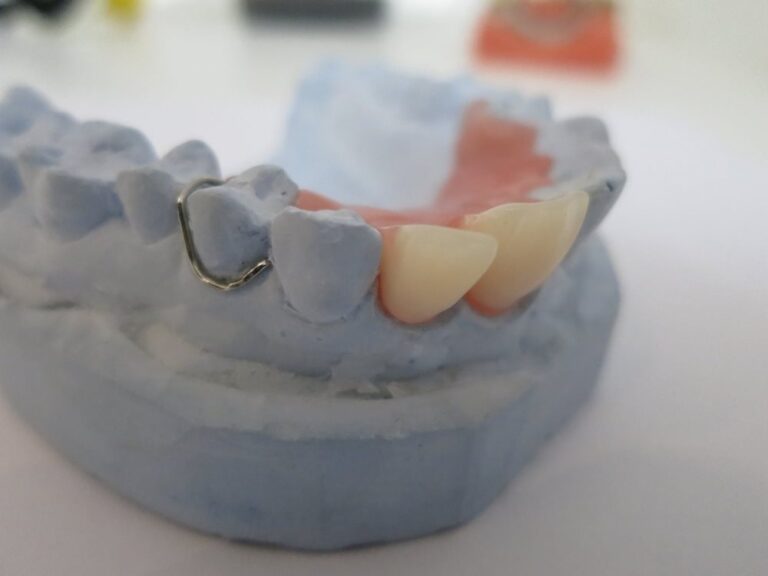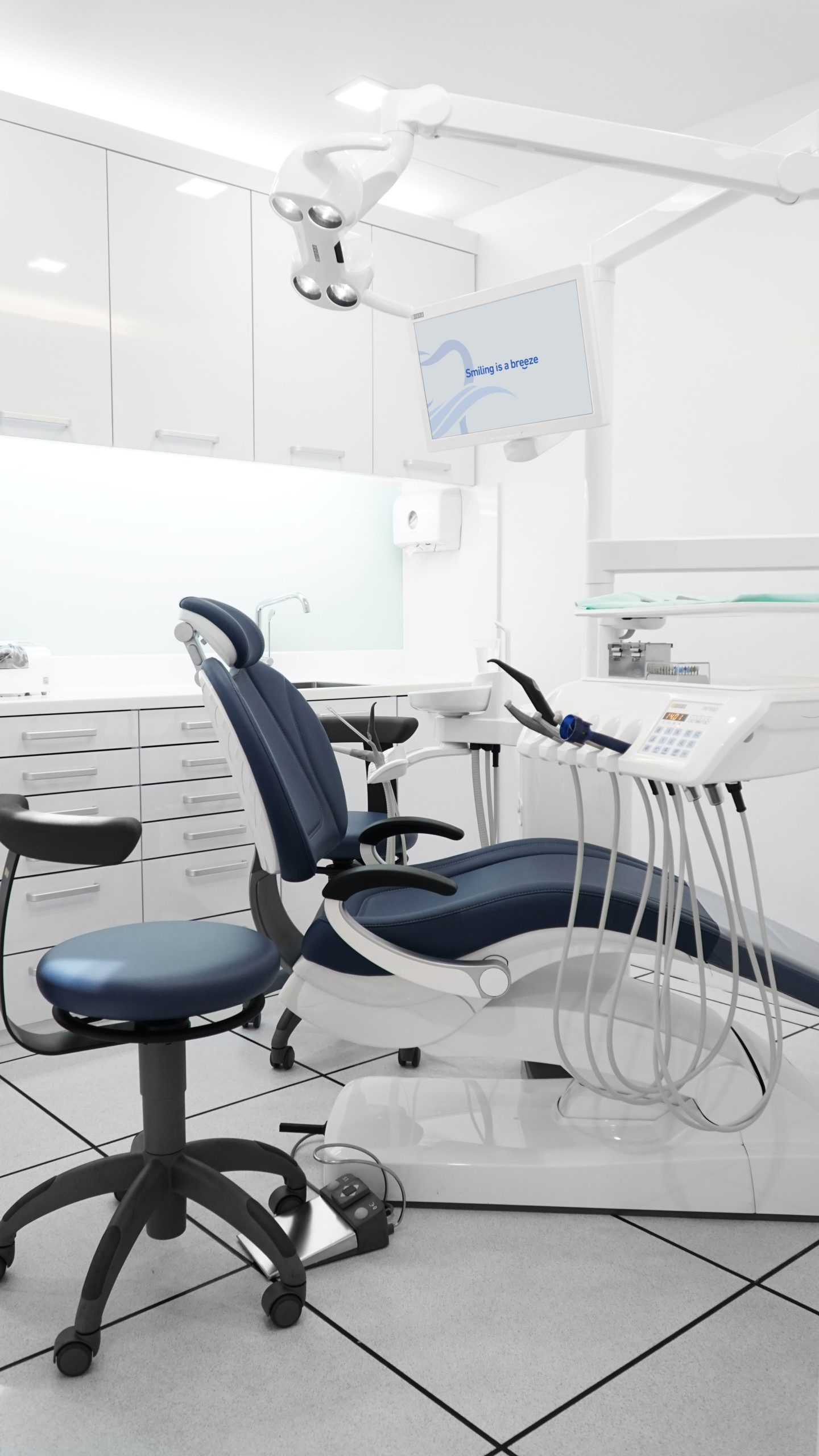Dentures are removable artificial teeth that act as a replacement for your missing natural teeth. These teeth replacement are attached to a base plate made of plastic (acrylic) and/or metal. Wearing dentures not only restore your appearance but more importantly aids in your day to day functions such as speaking and eating.


Partial denture
Partial dentures are fitted to replace teeth that are missing. In such cases, partial dentures are used when there are still healthy teeth left, and these partial dentures often come with clasps that hold your denture in place by hooking on to your tooth.

Immediate denture
In some situations whereby extraction of front teeth is required, the aesthetic look may be a concern and you may require something to close the missing gap immediately. In such cases, immediate temporary dentures can be made prior to the extraction and inserted right after the extraction is done. However, some adjustments and reline of the denture base may be required a few months later after the extraction wound heals and recover so that the final denture will fit better.

Full/ Complete denture
Complete dentures replace the whole row of teeth (either upper/ lower). In such a situation, there are no longer any natural teeth left on the entire arch. Since there are no longer any teeth to hold the denture in place, the complete denture relies greatly on your teeth and gums tissues for retention.
Having dentures to replace one or more teeth has many benefits such as:
Restoring appearance by closing up gaps in between your teeth
Improving speech/ pronunciation as compared to having missing teeth
Restoring the ability to chew and eat better
Regain self confidence with improved aesthetic and smile
Prevent unwanted tooth movement on remaining natural teeth
The three main types of materials for dentures are:
Acrylic resin – the most common and cost effective material for dentures, and the benefit of adding on more teeth to it to replace new missing teeth that are lost after the dentures are made.
Metal – such as a mixture of cobalt and chromium as the base of the denture. The visible portion of the denture are still gum-like colour for the gum tissues and white for teeth. Metal dentures tend to be less bulky and more sturdy too.
Flexible material – such as nylon and polyester are the most advanced of all the materials for partial dentures with benefits of not requiring additional metal hooks, more natural and aesthetically pleasant and less prone to breakage.

Fabrication of dentures usually takes a few visits to the clinic, and in most cases, the success of denture treatment relies greatly on the cooperation and understanding of patients.
Fabrication of a denture generally involves a few stages.
Primary Impression taking
Master impression taking (more accurate version using a customized special tray)
Maxillomandibular relationship (MMR) record/ Bite registration
Try-in of a wax mock-up version of the denture
Issue of final denture
Review and adjustment
Depending on the number of teeth required for replacement and also the complexity of each case, some steps may be skipped or done concurrently on the same visit.
Dentures may feel uncomfortable and strange at first, but you will get used to wearing them as long as you persevere (just like a new pair of shoe).
Here are some important tips to help you look after your dentures and your mouth:
Remove your dentures at night
Brush the dentures with a separate soft bristled brush and soap (Do NOT use toothpaste as it may cause abrasion and damage the denture surface!)
Soak the dentures in soaking solution such as antibacterial dentures cleaner according to the recommended time. After that, simple soak the dentures in clean water overnight.
Brush your remaining teeth as per normal to maintain good oral health. It is important to take care of your remaining natural teeth to prevent any tooth decay or gums disease as these remaining teeth can help your dentures stay retentive and stable.
Visit your dentist regularly to have routine check up!
Dentures that don’t fit well or become loose over time is a very common problem affecting most people wearing dentures. This is especially common with lower dentures/ lower complete dentures as there are less supporting structures and more movement due to the tongue and cheek. Ill fitting dentures are usually caused by changes to the jaw and bone after tooth loss, resulting in shrinkage of the bone and ridge.
Denture adhesive (or commonly known as denture glue) may be useful to hold your dentures in place. Apply adhesive in short strips, not too close to the edges. Rinse mouth before inserting dentures and press denture into place, hold firmly, and bite down for a few seconds to secure hold. To remove denture adhesive, rinse your mouth with some warm water before removing your dentures using a rocking motion. Remember to remove all the remaining denture adhesive from your dentures before storing them in water overnight.
Dentures may also be able to be retained by dental implants – also known as implant retained dentures. This is achieved by placing 4 to 6 dental implants into your jaw, which allows your dentures to “lock or clip” in place. This is a good alternative to conventional dentures for replacing missing teeth in the entire jaw!
Taking good care of your denture is as important as taking care of your teeth.
They should be removed after every meal to wash off any food particles. Brush the denture gently with a soft toothbrush and soak it in a denture cleansing solution once a week to disinfect and clean the denture.
When not wearing, always soak the denture in water to prevent it from losing its shape. Poor denture hygiene may result in stains, bad odor, and oral infections.
The price for dentures depends on a few factors, such as the number of teeth required on the denture and the type of material (acrylic, metal or flexible material). Generally, a single tooth denture starts from $360 and complete full dentures are around $650-$750.
Note: Government Goods and Services Tax (GST) applies.
Yes! For patients with CHAS card, there will be a subsidy from the government. The amount of subsidy depends on the number of teeth required on the dentures. The subsidy amount also varies for different types of CHAS card (Orange, Blue, Merdeka and Pioneer).
Related: CHAS Dental Subsidies
Medisave can only be used for surgical procedures. Hence, it cannot be used for normal dentures.
Depending on how badly broken the denture is, it may be possible to fix/ repair it. To denture wearers, please feel free to contact us for an appointment to allow our dentist to check for you.
Depending on how badly broken the denture is, it may be as quick as within the same day or up to a week if we need to send the case to an external dental laboratory for more complex cases.
Yes, it may be possible to reline or adjust your old denture to make it fit better! Do contact us for an appointment to allow our dentist to check for you.
Don’t hesitate to contact us!
WhatsApp us